Adams J.T. Empire on the Seven Seas. The British Empire 1784-1939
Подождите немного. Документ загружается.

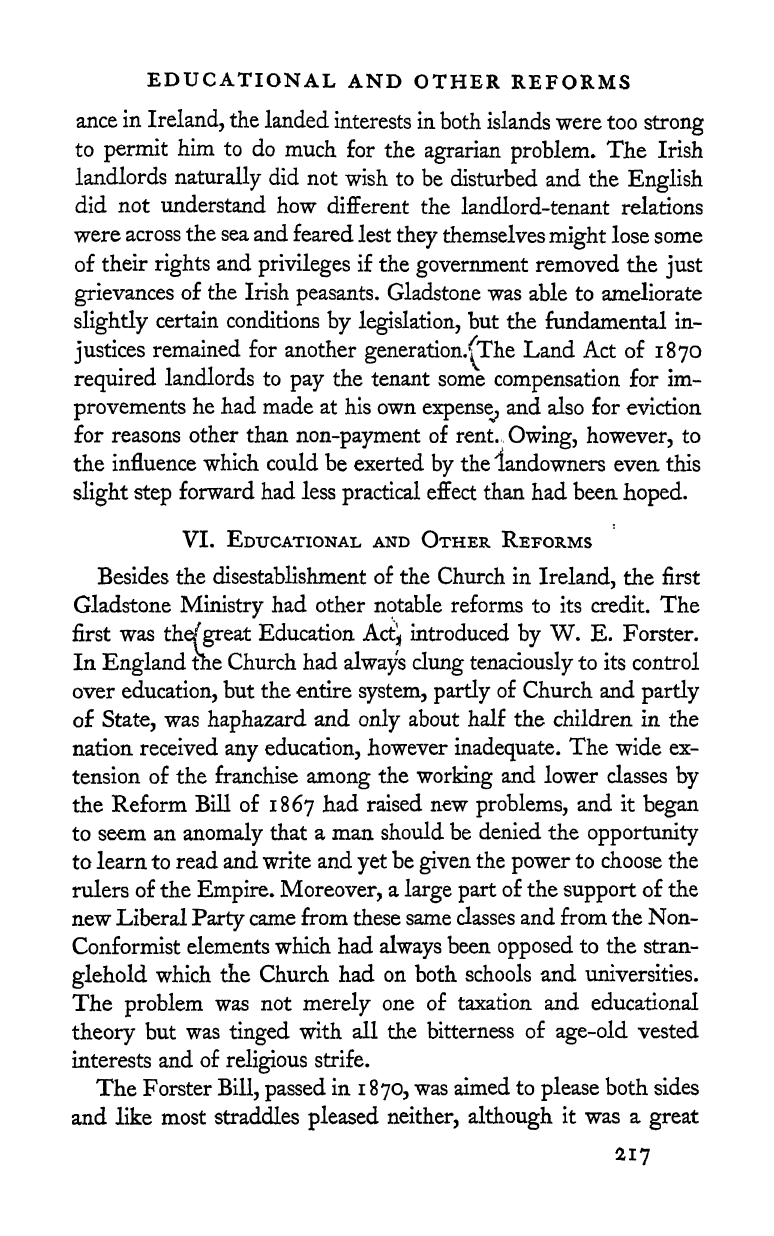
EDUCATIONAL
AND
OTHER
REFORMS
ance
in
Ireland,
the
landed
interests in
both
islands were
too
strong
to
permit
him
to
do
much
for
the
agrarian problem*
The
Irish
landlords
naturally
did
not
wish to
be
disturbed and
the
English
did
not
understand
how
different
the
landlord-tenant
relations
were
across the
sea
and
feared lest
they
themselves
might
lose
some
of
their
rights
and
privileges
if the
government
removed
the
just
grievances
of
the
Irish
peasants.
Gladstone
was
able to ameliorate
slightly
certain
conditions
by
legislation,
but
the
fundamental
in-
justices
remained for another
generation/The
Land
Act of
1870
required
landlords
to
pay
the tenant some
compensation
for
im-
provements
he had
made
at his own
expense^
and
also
for
eviction
for
reasons
other
than
non-payment
of rent.
Owing,
however,
to
the
influence which
could
be
exerted
by
the
landowners even
this
slight
step
forward had less
practical
effect
than
had been
hoped.
VI.
EDUCATIONAL
AND
OTHER REFORMS
Besides the disestablishment
of the
Church in
Ireland,
the
first
Gladstone
Ministry
had other notable reforms
to its
credit.
The
first
was
the/great
Education
Act$
introduced
by
W.
E.
Forster.
In
England
the Church
had
always
clung
tenaciously
to
its control
over
education,
but
the entire
system,
partly
of
Church and
partly
of
State,
was
haphazard
and
only
about
half the
children
in
the
nation
received
any
education,
however
inadequate.
The
wide
ex-
tension
of the
franchise
among
the
working
and lower
classes
by
the
Reform
Bill
of
1867
had
raised new
problems,
and
it
began
to
seem an
anomaly
that a man should be
denied
the
opportunity
to
learn to
read
and
write
and
yet
be
given
the
power
to choose
the
rulers
of
the
Empire.
Moreover,
a
large
part
of the
support
of
the
new Liberal
Party
came
from these
same classes and from
the
Non-
Conformist
elements which
had
always
been
opposed
to
the
stran-
glehold
which
the Church had
on both
schools
and
universities.
The
problem
was
not
merely
one of taxation
and
educational
theory
but
was
tinged
with
all
the bitterness
of
age-old
vested
interests
and
of
religious
strife.
The
Forster
Bill,
passed
in
1
870,
was
aimed
to
please
both sides
and
like most
straddles
pleased
neither,
although
it
was
a
great
217
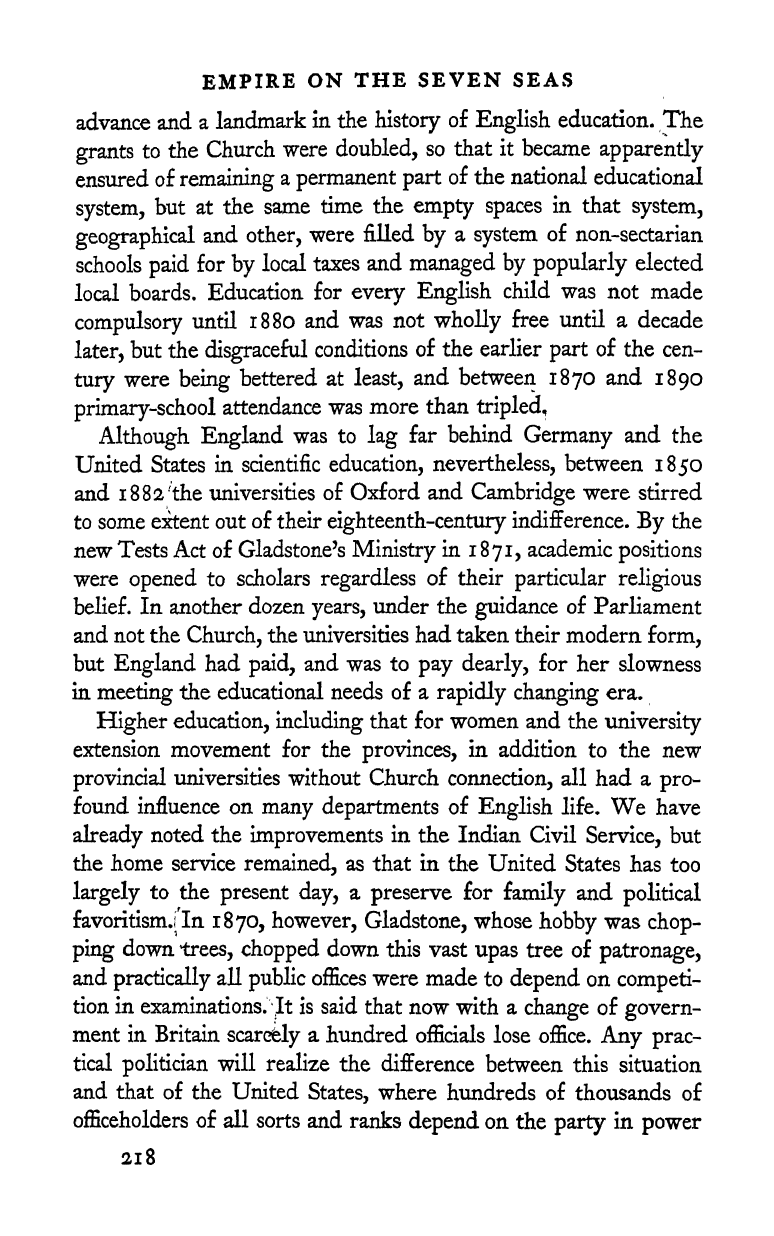
EMPIRE
ON
THE
SEVEN SEAS
advance
and
a
landmark
in
the
history
of
English
education.
The
grants
to
the
Church
were
doubled,
so
that it became
apparently
ensured
of
remaining
a
permanent
part
of the national
educational
system,
but at
the
same
time the
empty
spaces
in
that
system,
geographical
and
other,
were
filled
by
a
system
of
non-sectarian
schools
paid
for
by
local
taxes
and
managed
by
popularly
elected
local
boards.
Education
for
every
English
child was
not
made
compulsory
until 1880
and
was
not
wholly
free until a
decade
later,
but the
disgraceful
conditions
of the
earlier
part
of
the cen-
tury
were
being
bettered
at
least,
and between
1870
and
1890
primary-school
attendance
was
more
than
tripled,
Although
England
was to
lag
far behind
Germany
and
the
United
States
in
scientific
education,
nevertheless,
between
1850
and
1
8 82
'the
universities
of Oxford
and
Cambridge
were
stirred
to
some
extent
out of
their
eighteenth-century
indifference.
By
the
new
Tests
Act of
Gladstone's
Ministry
in
1871,
academic
positions
were
opened
to
scholars
regardless
of their
particular
religious
belief.
In
another
dozen
years,
under
the
guidance
of
Parliament
and not the
Church,
the universities
had
taken
their modern
form,
but
England
had
paid,
and
was
to
pay
dearly,
for
her
slowness
in
meeting
the educational needs of
a
rapidly
changing
era.
Higher
education,
including
that for women and
the
university
extension movement
for
the
provinces,
in
addition
to
the
new
provincial
universities without Church
connection,
all
had
a
pro-
found influence on
many
departments
of
English
life. We
have
already
noted
the
improvements
in
the Indian
Civil
Service,
but
the home
service
remained,
as that
in
the
United
States
has
too
largely
to the
present day,
a
preserve
for
family
and
political
favoritism/In
1870,
however,
Gladstone,
whose
hobby
was
chop-
ping
down
trees,
chopped
down
this vast
upas
tree
of
patronage,
and
practically
all
public
offices
were made
to
depend
on
competi-
tion
in
examinations.
\It
is
said
that
now
with
a
change
of
govern-
ment
in Britain
scarcely
a
hundred
officials lose
office.
Any
prac-
tical
politician
will
realize
the
difference
between this situation
and
that of the United
States,
where
hundreds of thousands
of
officeholders
of
all sorts
and
ranks
depend
on
the
party
in
power
218
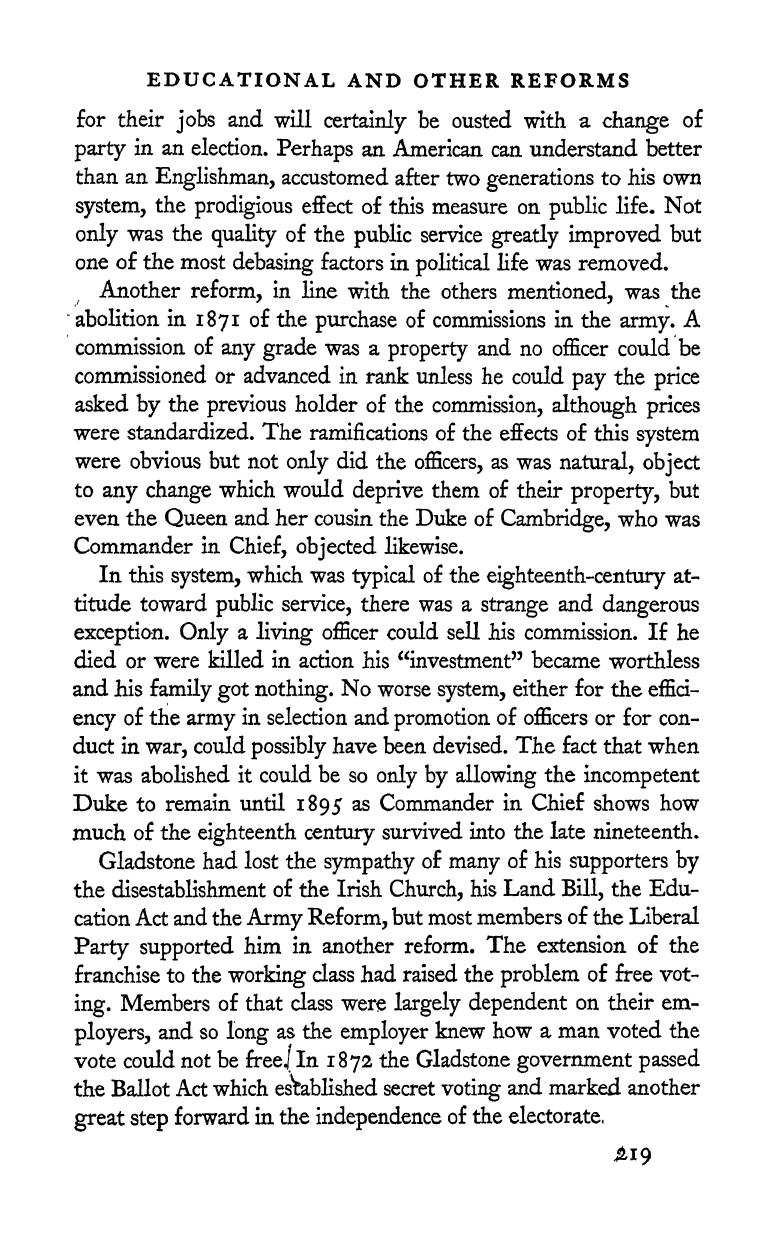
EDUCATIONAL
AND
OTHER
REFORMS
for
their
jobs
and will
certainly
be
ousted with
a
change
of
party
in
an
election.
Perhaps
an
American can
understand
better
than
an
Englishman,
accustomed
after
two
generations
to
his
own
system,
the
prodigious
effect of
this measure on
public
life. Not
only
was the
quality
of the
public
service
greatly
improved
but
one
of the most
debasing
factors in
political
life
was
removed.
Another
reform,
in
line
with the
others
mentioned,
was
the
'
abolition
in
1871
of
the
purchase
of commissions
in
the
army.
A
commission of
any
grade
was
a
property
and no
officer could
be
commissioned or advanced in
rank
unless he
could
pay
the
price
asked
by
the
previous
holder
of the
commission,
although
prices
were
standardized. The
ramifications of
the
effects
of this
system
were
obvious but not
only
did
the
officers,
as
was
natural,
object
to
any change
which would
deprive
them
of their
property,
but
even the
Queen
and
her
cousin the
Duke
of
Cambridge,
who was
Commander
in
Chief,
objected
likewise.
In
this
system,
which
was
typical
of
the
eighteenth-century
at-
titude toward
public
service,
there was
a
strange
and
dangerous
exception.
Only
a
living
officer
could
sell his
commission. If
he
died
or
were killed
in
action
his "investment" became
worthless
and
his
family
got
nothing.
No
worse
system,
either
for
the effici-
ency
of
the
army
in
selection
and
promotion
of officers
or for
con-
duct
in
war,
could
possibly
have been
devised.
The
fact
that when
it
was abolished
it
could
be
so
only
by
allowing
the
incompetent
Duke
to
remain until
1895
as Commander
in
Chief shows
how
much of
the
eighteenth
century
survived
into the
late
nineteenth.
Gladstone
had
lost the
sympathy
of
many
of
his
supporters
by
the disestablishment
of
the
Irish
Church,
his
Land
Bill,
the
Edu-
cation
Act
and
the
Army
Reform,
but
most
members
of
the Liberal
Party supported
him
in
another
reform.
The extension
of
the
franchise
to the
working
class
had
raised
the
problem
of
free
vot-
ing.
Members
of
that
class
were
largely
dependent
on their
em-
ployers,
and so
long
as
the
employer
knew
how a
man
voted
the
vote
could
not
be
free/
In
1872
the
Gladstone
government
passed
the
Ballot
Act
which
established secret
voting
and
marked another
great
step
forward
in
the
independence
of
the
electorate,
19
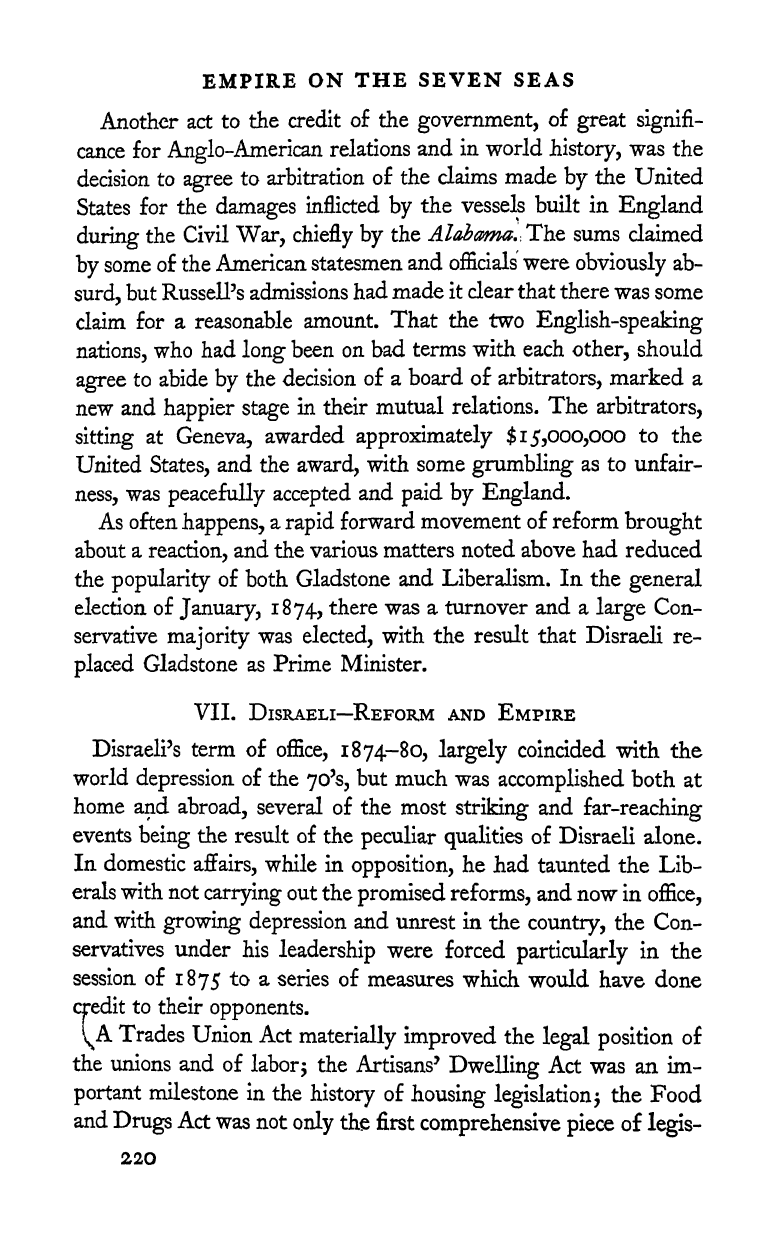
EMPIRE
ON
THE SEVEN
SEAS
Another
act
to the
credit
of
the
government,
of
great
signifi-
cance
for
Anglo-American
relations
and
in
world
history,
was the
decision
to
agree
to
arbitration
of
the
claims
made
by
the
United
States
for
the
damages
inflicted
by
the
vessels
built in
England
during
the
Civil
War,
chiefly
by
the
Alabama..
The
sums
claimed
by
some
of the
American
statesmen
and
officials were
obviously
ab-
surd,
but
Russell's
admissions had
made it
clear
that
there
was some
claim
for a reasonable
amount.
That
the two
English-speaking
nations,
who
had
long
been
on bad
terms with each
other,
should
agree
to
abide
by
the
decision
of
a
board
of
arbitrators,
marked a
new
and
happier
stage
in their
mutual relations.
The
arbitrators,
sitting
at
Geneva,
awarded
approximately
$15,000,000
to
the
United
States,
and
the
award,
with
some
grumbling
as to
unfair-
ness,
was
peacefully
accepted
and
paid
by England.
As often
happens,
a
rapid
forward
movement
of reform
brought
about
a
reaction,
and
the
various
matters noted
above
had reduced
the
popularity
of
both
Gladstone
and
Liberalism.
In
the
general
election of
January,
1874,
there
was a
turnover
and
a
large
Con-
servative
majority
was
elected,
with
the
result that
Disraeli
re-
placed
Gladstone as
Prime Minister.
VII.
DISRAELI
REFORM
AND
EMPIRE
Disraeli's
term
of
office,
1874-80,
largely
coincided
with
the
world
depression
of
the
70'$,
but
much
was
accomplished
both
at
home and
abroad,
several of the
most
striking
and
far-reaching
events
being
the
result
of
the
peculiar
qualities
of
Disraeli
alone.
In domestic
affairs,
while
in
opposition,
he
had
taunted the
Lib-
erals
with not
carrying
out
the
promised
reforms,
and
now in
office,
and with
growing depression
and
unrest
in
the
country,
the
Con-
servatives under
his
leadership
were
forced
particularly
in
the
session
of
1875
to a
series
of
measures
which
would have done
lit to
their
opponents.
Trades
Union Act
materially improved
the
legal position
of
the unions and
of
labor;
the
Artisans'
Dwelling
Act
was an
im-
portant
milestone in
the
history
of
housing
legislation}
the Food
and
Drugs
Act was
not
only
the
first
comprehensive
piece
of
legis-
220
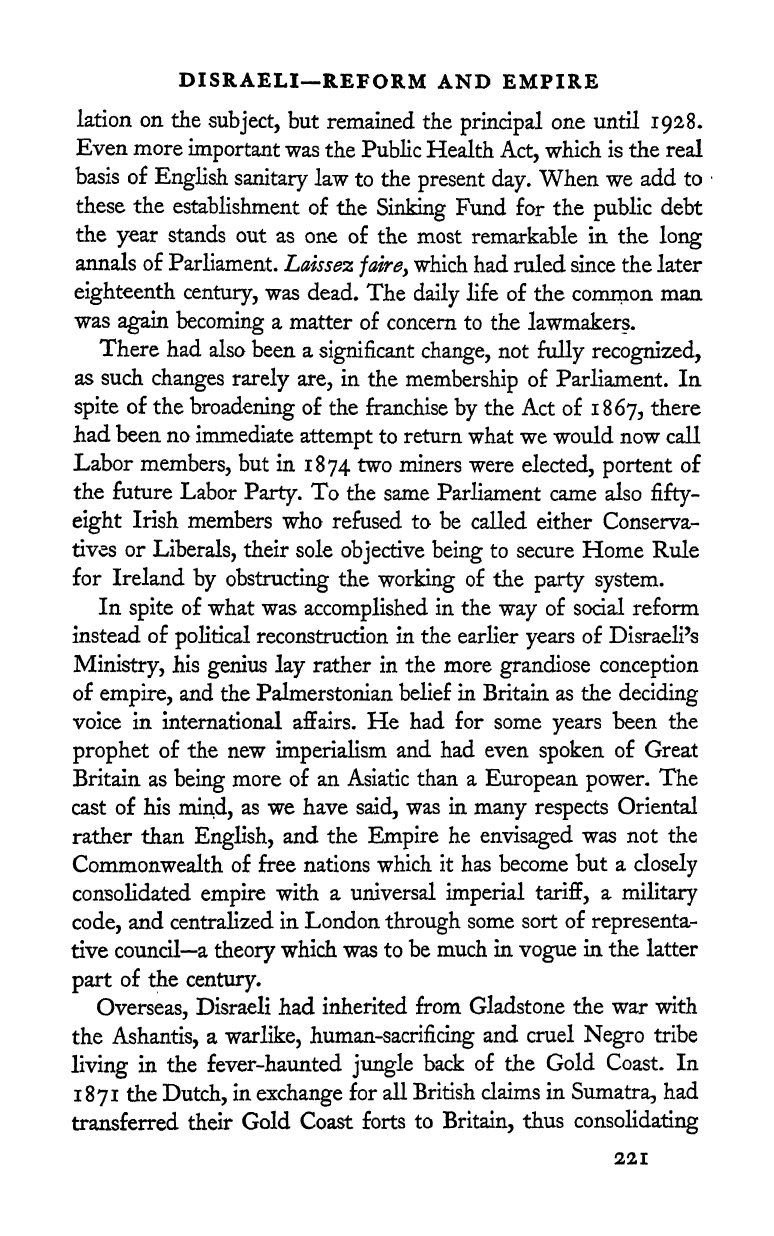
DISRAELI
REFORM AND
EMPIRE
lation
on
the
subject,
but
remained
the
principal
one
until
1928.
Even more
important
was
the
Public Health
Act,
which
is
the
real
basis of
English
sanitary
law
to the
present
day.
When we
add to
these the
establishment
of
the
Sinking
Fund
for
the
public
debt
the
year
stands
out
as one
of the most
remarkable
in
the
long
annals of
Parliament.
Laissez
jaire
y
which
had ruled since
the
later
eighteenth
century,
was
dead.
The
daily
life
of
the
common
man
was
again
becoming
a matter
of
concern to
the lawmakers.
There had
also been a
significant
change,
not
fully
recognized,
as
such
changes
rarely
are,
in
the
membership
of Parliament.
In
spite
of
the
broadening
of
the
franchise
by
the
Act of
1867,
there
had been
no
immediate
attempt
to
return
what we would
now call
Labor
members,
but in
1874
two miners
were
elected,
portent
of
the future
Labor
Party.
To the
same
Parliament came also
fifty-
eight
Irish
members
who refused to be
called either
Conserva-
tives
or
Liberals,
their
sole
objective
being
to
secure
Home Rule
for
Ireland
by
obstructing
the
working
of the
party system.
In
spite
of
what
was
accomplished
in the
way
of social
reform
instead of
political
reconstruction
in
the
earlier
years
of
Disraeli's
Ministry,
his
genius
lay
rather in the more
grandiose conception
of
empire,
and
the
Palmerstonian
belief
in
Britain
as the
deciding
voice
in
international
affairs.
He had
for
some
years
been
the
prophet
of
the
new
imperialism
and
had
even
spoken
of
Great
Britain
as
being
more of
an Asiatic
than
a
European power.
The
cast
of
his
mind,
as we have
said,
was
in
many respects
Oriental
rather
than
English,
and the
Empire
he
envisaged
was not the
Commonwealth
of free nations
which
it has become
but
a
closely
consolidated
empire
with
a universal
imperial
tariff,
a
military
code,
and centralized
in
London
through
some sort
of
representa-
tive
councila
theory
which
was to
be much
in
vogue
in the
latter
part
of
the
century.
Overseas,
Disraeli had
inherited
from Gladstone
the war with
the
Ashantis,
a
warlike,
human-sacrificing
and cruel
Negro
tribe
living
in the
fever-haunted
jungle
back
of
the
Gold
Coast.
In
1871
the
Dutch,
in
exchange
for
all
British claims
in
Sumatra,
had
transferred
their
Gold
Coast
forts
to
Britain,
thus
consolidating
221
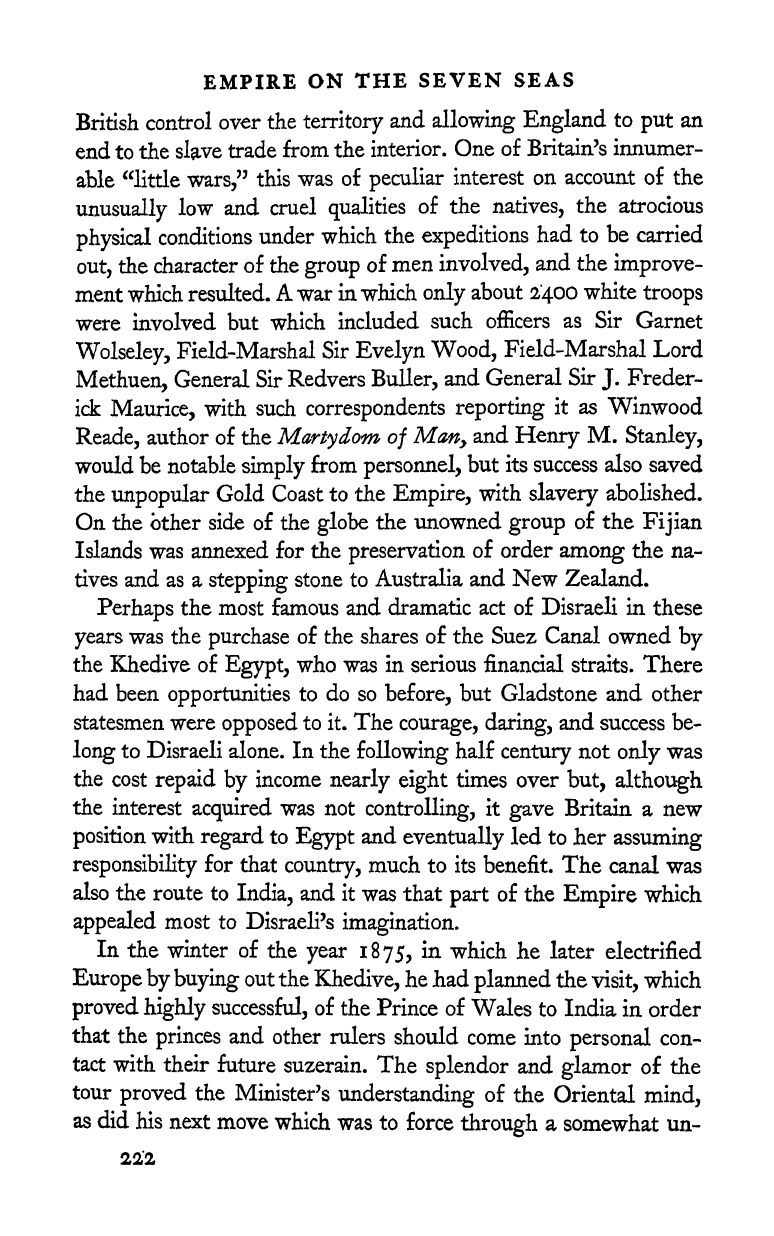
EMPIRE
ON THE
SEVEN
SEAS
British control
over
the
territory
and
allowing
England
to
put
an
end to
the
slave
trade
from the
interior.
One
of
Britain's
innumer-
able
"little
wars,"
this
was
of
peculiar
interest
on
account of the
unusually
low
and
cruel
qualities
of
the
natives,
the
atrocious
physical
conditions
under which
the
expeditions
had
to
be
carried
out,
the
character
of the
group
of
men
involved,
and
the
improve-
ment
which
resulted.
A
war
in
which
only
about
2*400
white
troops
were involved
but which
included
such
officers
as
Sir
Garnet
Wolseley,
Field-Marshal
Sir
Evelyn
Wood,
Field-Marshal
Lord
Methuen,
General Sir
Redvers
Buller,
and
General
Sir
J.
Freder-
ick
Maurice,
with
such
correspondents
reporting
it as
Winwood
Reade,
author of the
Marty
dom
of
Man,
and
Henry
M.
Stanley,
would be notable
simply
from
personnel,
but
its success
also
saved
the
unpopular
Gold
Coast
to the
Empire,
with
slavery
abolished.
On the
other
side
of
the
globe
the
unowned
group
of the
Fijian
Islands
was annexed
for the
preservation
of
order
among
the
na-
tives
and
as a
stepping
stone
to
Australia
and New
Zealand.
Perhaps
the
most famous
and
dramatic act
of
Disraeli in
these
years
was the
purchase
of the
shares of the Suez Canal
owned
by
the
Khedive
of
Egypt,
who was
in
serious financial
straits.
There
had
been
opportunities
to
do
so
before,
but Gladstone and
other
statesmen were
opposed
to it.
The
courage,
daring,
and
success be-
long
to Disraeli
alone. In
the
following
half
century
not
only
was
the
cost
repaid
by
income
nearly
eight
times over
but,
although
the
interest
acquired
was not
controlling,
it
gave
Britain
a
new
position
with
regard
to
Egypt
and
eventually
led to
her
assuming
responsibility
for
that
country,
much
to its
benefit. The
canal was
also
the route
to
India,
and
it
was that
part
of the
Empire
which
appealed
most to
Disraeli's
imagination.
In
the
winter
of
the
year
1875,
in
which
he
later
electrified
Europe
by
buying
out the
Khedive,
he
had
planned
the
visit,
which
proved
highly
successful,
of
the Prince
of
Wales
to India
in
order
that
the
princes
and
other
rulers
should
come
into
personal
con-
tact with
their
future
suzerain.
The
splendor
and
glamor
of the
tour
proved
the
Minister's
understanding
of
the
Oriental
mind,
as did
his next move
which
was
to force
through
a
somewhat
un-
22'2
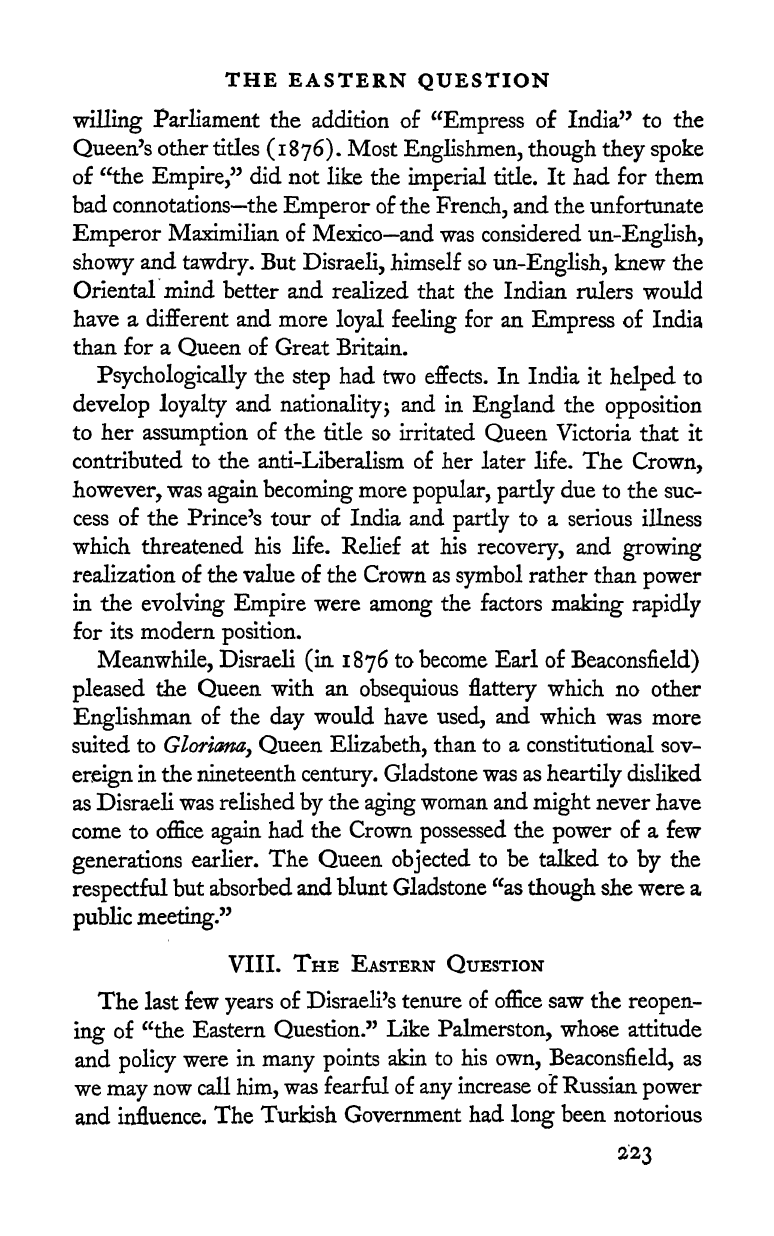
THE
EASTERN
QUESTION
willing
Parliament the
addition
of
"Empress
of
India" to
the
Queen's
other
titles
(1876).
Most
Englishmen, though
they
spoke
of
"the
Empire,"
did not
like the
imperial
title. It
had
for them
bad connotations the
Emperor
of
the
French,
and the
unfortunate
Emperor
Maximilian
of
Mexico and
was
considered
un-English,
showy
and
tawdry.
But
Disraeli,
himself
so
un-English,
knew the
Oriental
mind
better
and
realized
that
the
Indian
rulers
would
have
a
different and
more
loyal
feeling
for
an
Empress
of
India
than for a
Queen
of
Great Britain.
Psychologically
the
step
had
two
effects. In
India
it
helped
to
develop loyalty
and
nationality}
and
in
England
the
opposition
to
her
assumption
of
the
title
so irritated
Queen
Victoria
that it
contributed
to
the
anti-Liberalism of her
later
life.
The
Crown,
however,
was
again
becoming
more
popular,
partly
due
to
the
suc-
cess
of
the
Prince's
tour
of India and
partly
to a
serious illness
which
threatened
his
life.
Relief
at
his
recovery,
and
growing
realization
of
the
value
of the
Crown
as
symbol
rather
than
power
in
the
evolving Empire
were
among
the factors
making
rapidly
for
its
modern
position.
Meanwhile,
Disraeli
(in
1876
to
become
Earl
of
Beaconsfield)
pleased
the
Queen
with
an
obsequious
flattery
which
no
other
Englishman
of the
day
would have
used,
and
which
was
more
suited
to
Gloriana,
Queen
Elizabeth,
than to
a
constitutional sov-
ereign
in
the
nineteenth
century.
Gladstone
was as
heartily
disliked
as
Disraeli
was
relished
by
the
aging
woman
and
might
never
have
come
to
office
again
had
the
Crown
possessed
the
power
of a
few
generations
earlier.
The
Queen
objected
to be talked
to
by
the
respectful
but
absorbed
and
blunt
Gladstone
"as
though
she were a
public meeting."
VIII.
THE
EASTERN
QUESTION
The
last
few
years
of
Disraeli's
tenure
of
office
saw
the
reopen-
ing
of
"the
Eastern
Question."
Like
Palmerston,
whose
attitude
and
policy
were
in
many
points
akin to his
own,
Beaconsfield,
as
we
may
now
call
him,
was
fearful
of
any
increase
of
Russian
power
and
influence.
The
Turkish Government
had
long
been
notorious
223
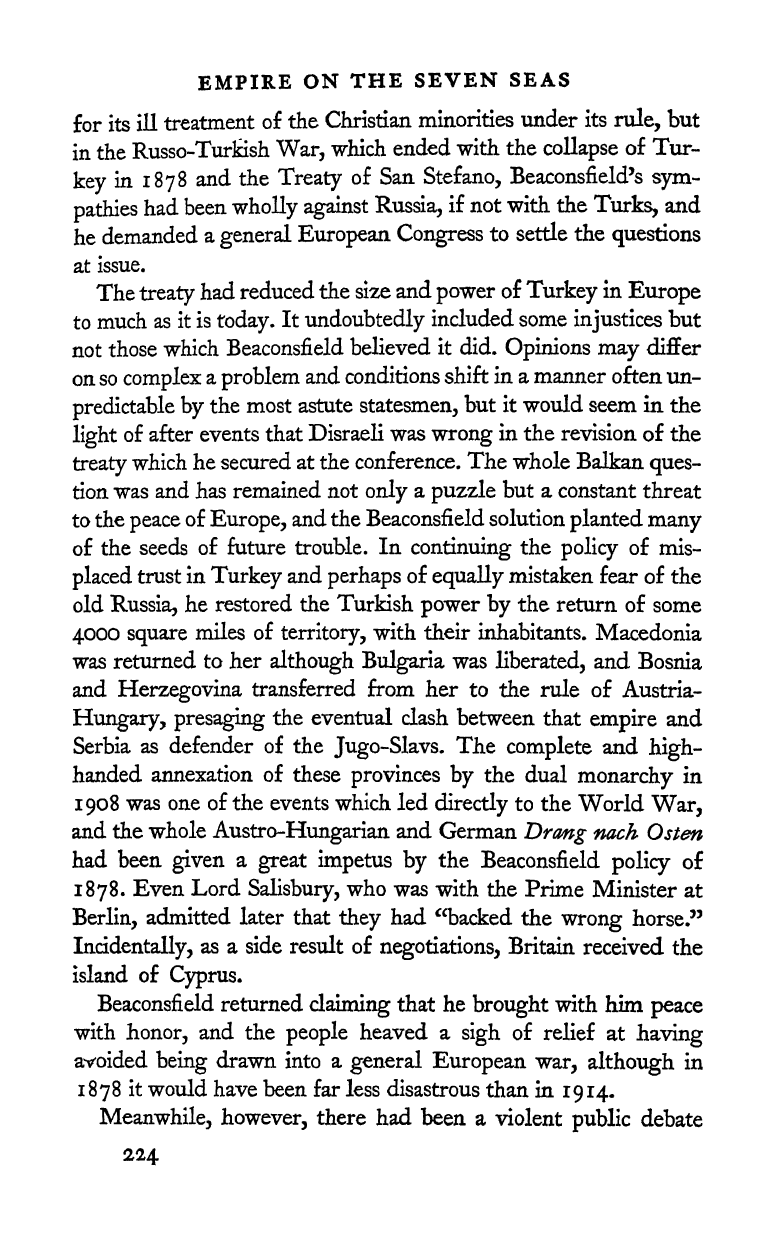
EMPIRE
ON
THE
SEVEN
SEAS
for
its
ill
treatment
of
the
Christian
minorities under
its
rule,
but
in
the
Russo-Turkish
War,
which
ended
with
the
collapse
of
Tur-
key
in
1878
and
the
Treaty
of San
Stefano,
Beaconsfield's
sym-
pathies
had
been
wholly
against
Russia,
if
not
with the
Turks,
and
he
demanded
a
general
European
Congress
to
settle the
questions
at
issue.
The
treaty
had
reduced
the
size
and
power
of
Turkey
in
Europe
to
much
as
it
is
today.
It
undoubtedly
included some
injustices
but
not
those
which
Beaconsfield
believed
it
did.
Opinions
may
differ
on
so
complex
a
problem
and
conditions shift
in a manner
often un-
predictable
by
the
most
astute
statesmen,
but it would seem
in
the
light
of after events
that
Disraeli was
wrong
in
the revision
of the
treaty
which
he
secured
at the
conference. The
whole Balkan
ques-
tion
was
and
has
remained not
only
a
puzzle
but a
constant
threat
to
the
peace
of
Europe,
and
the
Beaconsfield
solution
planted
many
of
the
seeds
of
future
trouble.
In
continuing
the
policy
of
mis-
placed
trust
in
Turkey
and
perhaps
of
equally
mistaken
fear
of
the
old
Russia,
he
restored the Turkish
power
by
the return
of
some
4000
square
miles
of
territory,
with
their
inhabitants.
Macedonia
was
returned
to
her
although Bulgaria
was
liberated,
and
Bosnia
and
Herzegovina
transferred from
her to
the
rule of
Austria-
Hungary,
presaging
the
eventual clash
between
that
empire
and
Serbia
as defender of the
Jugo-Slavs.
The
complete
and
high-
handed
annexation of these
provinces
by
the
dual
monarchy
in
1908
was
one
of
the events which led
directly
to
the
World
War,
and the whole
Austro-Hungarian
and
German
Drang
nach
Osten
had been
given
a
great impetus
by
the
Beaconsfield
policy
of
1878.
Even
Lord
Salisbury,
who
was
with
the
Prime
Minister
at
Berlin,
admitted
later
that
they
had
cc
backed
the
wrong
horse."
Incidentally,
as a
side result
of
negotiations,
Britain
received
the
island of
Cyprus.
Beaconsfield returned
claiming
that he
brought
with him
peace
with
honor,
and
the
people
heaved
a
sigh
of
relief
at
having
avoided
being
drawn
into
a
general European
war,
although
in
1878
it
would have
been
far
less
disastrous
than in
1914.
Meanwhile,
however,
there had
been
a
violent
public
debate
224.

THE
NEW
RADICALISM
and
conflict
of
opinion
as to
the
fundamental issues.
Beaconsfield
cared
nothing
about the
atrocities
and
stupefying
effects
of
Turkish
misrule.
For
him,
"peace
with
honor" meant
Britain
dictating
terms
and
increasing
her
strength
internationally
by
what
he
be-
lieved
was
the
right
Russo-Turkish
policy
for
her
to
pursue.
On
the
other hand
Gladstone,
filled
with
rage
and
righteous
indigna-
tion at what
he considered
the
betrayal
of
the
subject
Christian
peoples
of
the
Porte,
had
come
out
from his
proclaimed
retirement.
He took his
stand on
moral
and
not
political
ground
and denied
that
any
one
nation
should
demand for itself
a
dominant
position
in
the
general
councils o
Europe
and that
the
weight
of
Britain
should have
been thrown
on the side
of
the
weak
and
oppressed,
and not used
to
force
liberated
peoples
who
had
won freedom
to
place
their
necks
again
under
the
yoke
of
tyranny.
For
the
moment,
peace,
any
peace,
turned the
scales
in favor
of
the
Government,
but the
Ministry
was
fast
losing
popularity.
Gladstone's
cyclonic
moral
force
probably
had
deeper
effects
than
appeared
on the
surface
at
the
time,
and
the
anti-Russian
foreign
policy
of
Beaconsfield,
which involved
England
in
another
Afghan
war,
which will
be noticed
later,
was
becoming
unpopular.
A
war
with
the
Zulus and
the
deepening
agricultural depression
were
also
contributing
factors in
lowering
his
prestige,
and times were
chang-
ing
in
a
way
he
did
not
realize.
IX*
THE
NEW
RADICALISM
Joseph
Chamberlain in
Birmingham
had
organized
the
National
Liberal
Federation,
made
up
of
small
local
organizations
in which
the
newer
working-class
members of the
party
who had
been
given
potential
power
in
1
867
were
now
given
the
opportunity
of
making
their
voices
and
desires
heard
in the
party
councils to
an extent
which
would have
been believed
impossible
and
revolutionary
in
the
earlier
days
of aristocratic control.
Gladstone
understood
the
change
in the
political
air and in
his whirlwind
speaking
tour
known as
the
Midlothian
campaign
in
1879
h-
e
was
acclaimed
by
such
multitudes
as had never cheered
any
other
statesman.
They
not
only
cheered
but
voted,
and
the
new
Parliament
of
1880 had
225
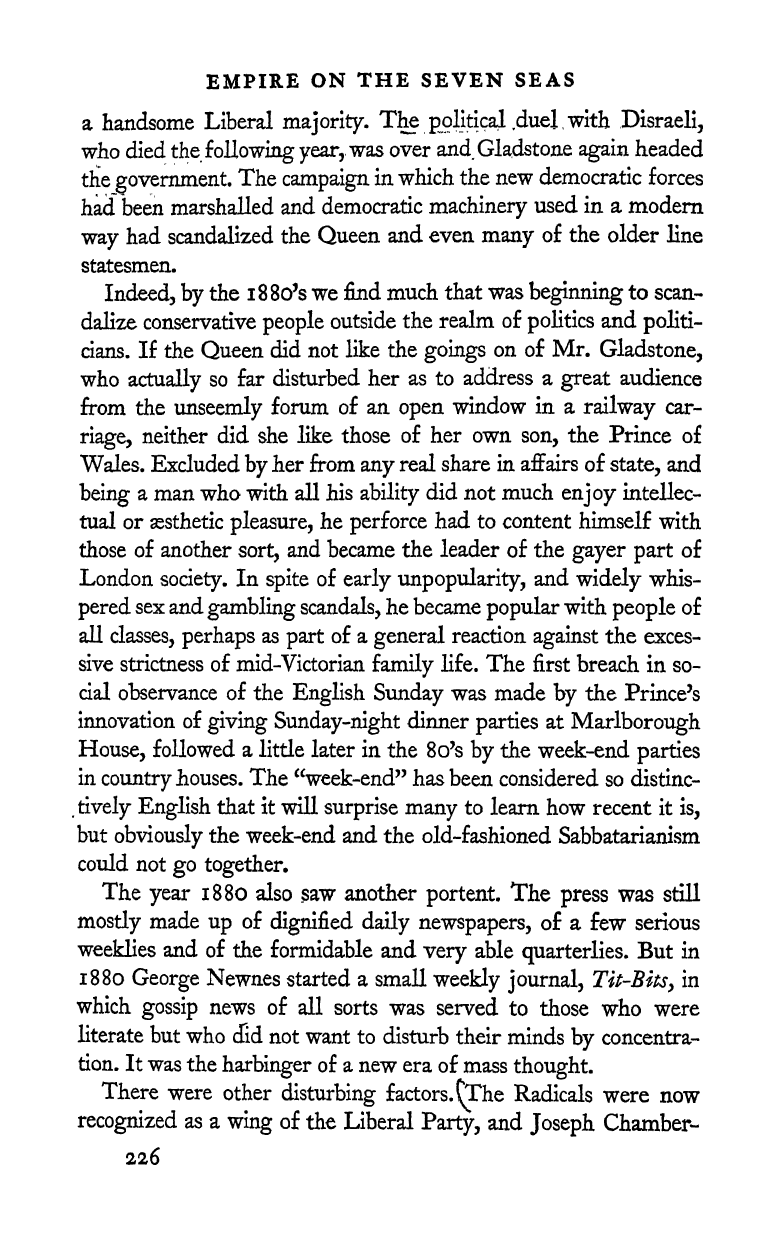
EMPIRE
ON
THE
SEVEN
SEAS
a handsome
Liberal
majority.
The
political
.duel,
with
Disraeli,
who
died
the
following year,
was over
and,
Gladstone
again
headed
the
government.
The
campaign
in
which
the
new
democratic
forces
had been
marshalled
and
democratic
machinery
used in a
modern
way
had scandalized
the
Queen
and
even
many
of the
older
line
statesmen.
Indeed,
by
the
i88o's
we
find
much
that
was
beginning
to
scan-
dalize
conservative
people
outside
the
realm
of
politics
and
politi-
cians.
If
the
Queen
did not
like the
goings
on of Mr.
Gladstone,
who
actually
so
far disturbed
her
as
to
address
a
great
audience
from the
unseemly
forum
of an
open
window
in a
railway
car-
riage,
neither
did she like
those
of her
own
son,
the
Prince of
Wales. Excluded
by
her from
any
real
share
in affairs
of
state,
and
being
a man who
with
all his
ability
did
not
much
enjoy
intellec-
tual or aesthetic
pleasure,
he
perforce
had
to
content himself
with
those
of
another
sort,
and
became
the
leader
of
the
gayer
part
of
London
society.
In
spite
of
early
unpopularity,
and
widely
whis-
pered
sex
and
gambling
scandals,
he
became
popular
with
people
of
all
classes,
perhaps
as
part
of a
general
reaction
against
the exces-
sive
strictness of mid-Victorian
family
life.
The
first
breach in so-
cial observance
of the
English Sunday
was
made
by
the
Prince's
innovation
of
giving
Sunday-night
dinner
parties
at
Marlborough
House,
followed
a
little
later in
the 8o's
by
the week-end
parties
in
country
houses.
The
"week-end" has
been considered
so distinc-
.tively
English
that it
will
surprise
many
to learn
how
recent
it
is,
but
obviously
the week-end and the
old-fashioned
Sabbatarianism
could not
go
together.
The
year
1880 also
saw
another
portent.
The
press
was still
mostly
made
up
of
dignified
daily
newspapers,
of a
few
serious
weeklies and
of the
formidable and
very
able
quarterlies.
But
in
1880
George
Newnes
started a small
weekly
journal,
Tit-Bits
,
in
which
gossip
news of
all sorts
was
served
to those
who were
literate
but who did
not
want
to
disturb their
minds
by
concentra-
tion.
It
was
the
harbinger
of
a
new
era
of
mass
thought.
There
were
other
disturbing
factors,
fa?he
Radicals were
now
recognized
as
a
wing
of
the
Liberal
Party,
and
Joseph
Chamber-
226
